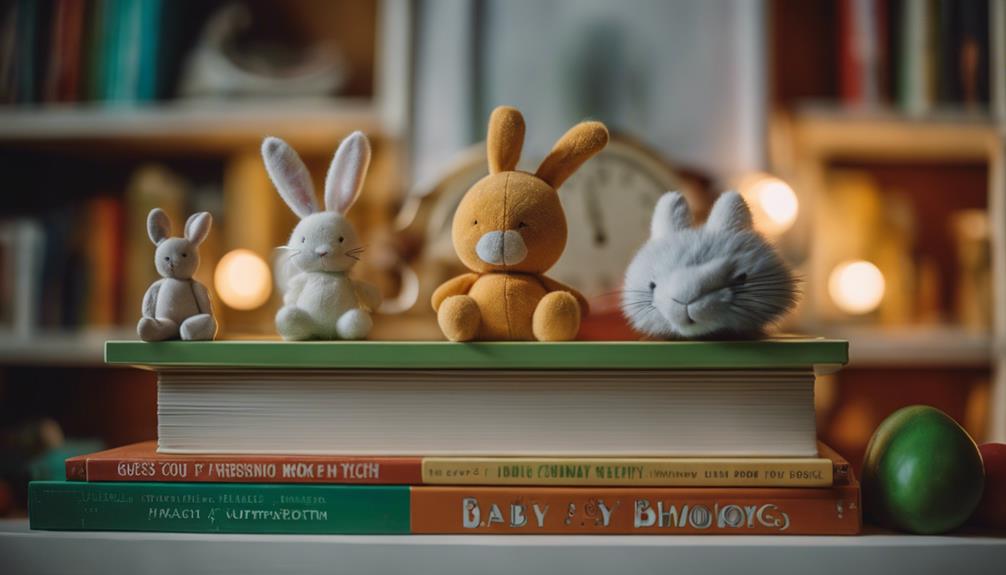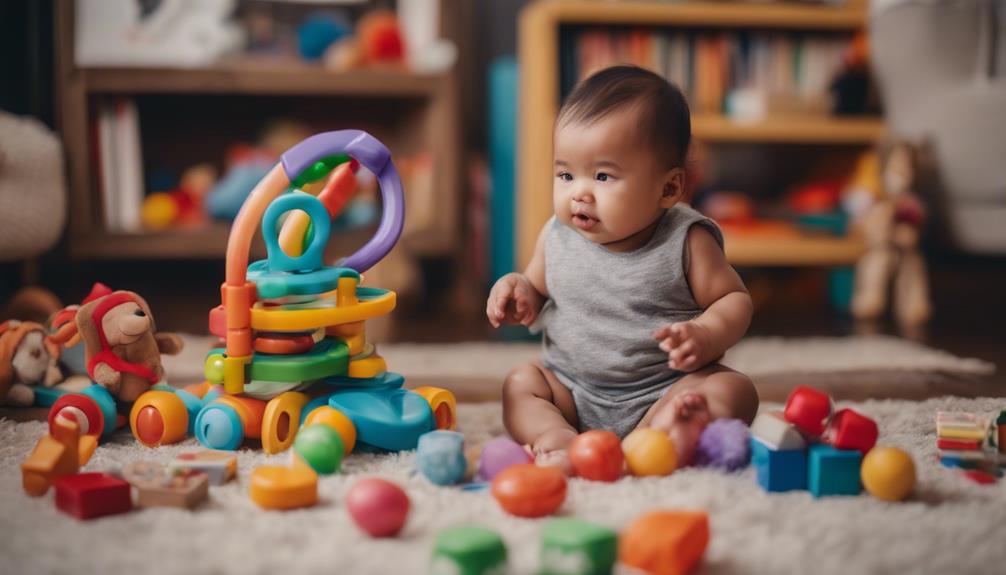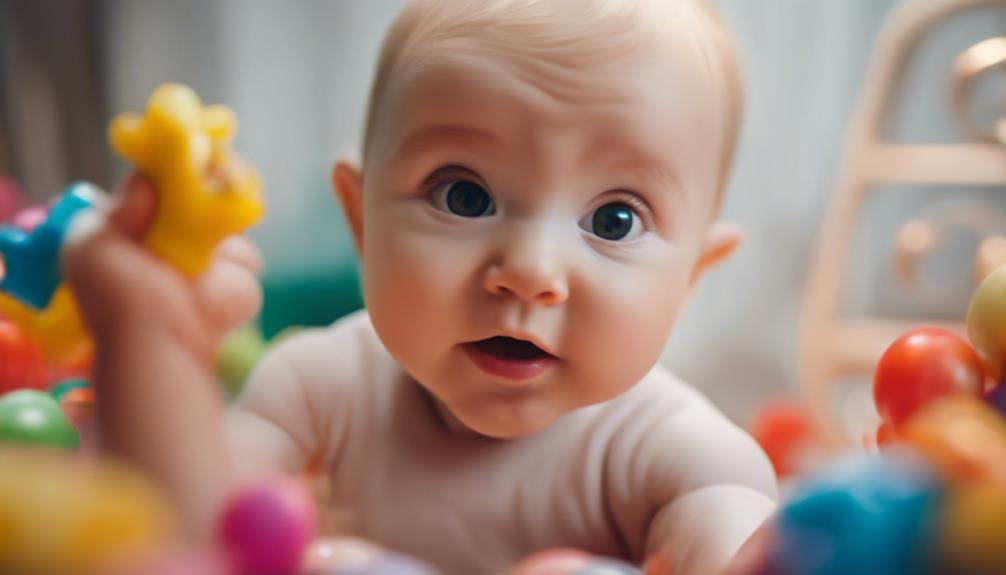To identify signs of a gifted baby, be on the lookout for advanced language skills, early cognitive abilities, exceptional memory, curiosity, puzzle-solving talents, high energy, early reading interest, and empathy. These characteristics can suggest exceptional giftedness in children. Each trait offers a glimpse into a child’s distinctive talents and potential. Recognizing these signs can assist in identifying giftedness at an early stage and supporting your child’s abilities effectively. Being aware of these attributes can help in offering suitable nurture and opportunities for their intellectual development. Continue monitoring for these indicators to discover more about your child’s unique talents and abilities.
Key Takeaways
- Gifted babies demonstrate advanced language skills and early communication abilities.
- Exceptional memory retention and quick recall of information are common traits in gifted babies.
- Curiosity, eagerness to learn, and a love for exploration are hallmark characteristics of gifted babies.
- Proficiency in puzzles, patterns, and problem-solving tasks can indicate giftedness in babies.
- Early reading skills, high sensitivity, and empathy are potential signs of giftedness in babies.
Early Language Acquisition
Identifying signs of giftedness in babies begins with observing their early language acquisition skills, which can provide valuable insights into their cognitive abilities. Gifted children often display remarkable progress in early language development, vocalizing different sounds as early as 1.61 months. Some gifted babies even begin saying their first words sooner than the average timeline, showcasing advanced linguistic abilities.
By approximately 16.8 months, these gifted babies may already be forming 3-word sentences, highlighting their rapid cognitive-language skills. Their advanced language acquisition sets them apart in early communication milestones, with a larger vocabulary and engagement in more complex language interactions compared to their peers at a young age.
Paying attention to these signs of advanced language development in babies can offer valuable clues about their potential giftedness and cognitive strengths from an early stage.
Advanced Cognitive Abilities

Gifted babies may demonstrate advanced cognitive abilities by forming 3-word sentences as early as 16.8 months old. Characteristics of advanced cognitive abilities in babies include vocalizing different sounds at 1.61 months, showing accelerated language development. Some gifted babies utter their first words earlier than average, indicating rapid cognitive-language progression.
Additionally, early responsiveness to their name and simple commands can be signs that a baby is gifted in cognitive abilities. Gifted toddlers often possess a larger vocabulary and engage in more intricate language interactions compared to their peers. When observing if a baby is gifted, look for these signs of advanced cognitive abilities as they can be early indicators of exceptional intellectual potential.
Keep an eye out for the baby's language milestones, such as forming 3-word sentences, which could suggest advanced cognitive development.
Exceptional Memory Skills
With exceptional memory skills, gifted babies often retain information quickly and for extended periods of time. Their advanced memory capabilities allow them to recall past events with remarkable accuracy and detail, showcasing a level of memory retention that surpasses their peers.
Gifted infants may exhibit early recognition of familiar faces, objects, and experiences, reflecting their heightened memory abilities.
This exceptional memory in gifted babies plays a significant role in their cognitive development, contributing to their rapid learning and understanding of the world around them. Their ability to retain and process information beyond what's typically expected for their age group sets them apart and highlights their advanced cognitive skills.
Observing a gifted baby's memory skills can provide valuable insights into their intellectual potential and future abilities. By recognizing and nurturing these exceptional memory capabilities, parents and caregivers can support the child's ongoing cognitive development and help them thrive in various learning environments.
Curiosity and Eagerness to Learn
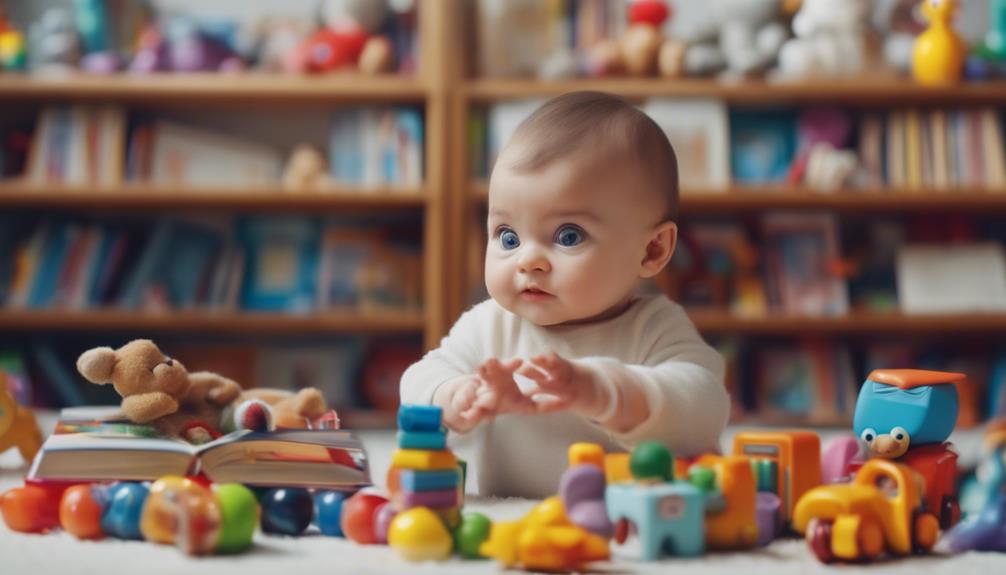
When observing gifted babies, their intense inquisitiveness and enthusiasm to learn are evident in their interactions with the world around them. Gifted infants often exhibit a strong desire to acquire new knowledge and skills, actively engaging with their environment and seeking out new experiences. Their enthusiasm to learn is displayed through their constant questioning and exploration of their surroundings from an early age. These babies showcase a natural curiosity that drives them to investigate and understand the world they live in.
From a young age, gifted babies display a keen interest in learning, showing a genuine curiosity about the world and a thirst for knowledge. Their curiosity leads them to actively seek out information and engage in activities that stimulate their minds.
Encouraging and nurturing this curiosity and inquisitiveness to learn in gifted babies can help support their intellectual development and foster a lifelong love for learning.
Talent for Puzzles and Patterns
Gifted babies often display remarkable talent for puzzles and patterns, effortlessly solving complex problem-solving tasks. Their advanced mathematical abilities allow them to quickly identify and manipulate intricate patterns with ease.
Proficiency in recognizing and deciphering patterns is a key indicator of their heightened cognitive skills from an early age.
Pattern Recognition Skills
A gifted baby's talent for puzzles and patterns shines through their exceptional ability to recognize intricate relationships and solve complex problems at an advanced level. Gifted babies often display remarkable pattern recognition skills, showcasing a strong numerical aptitude and problem-solving abilities from a young age.
Their proficiency in recognizing patterns serves as a key indicator of their giftedness, with some demonstrating advanced mathematical capabilities early on. These babies excel in identifying sequences, relationships, and structures, allowing them to navigate through puzzles and patterns with ease. Their knack for detecting and understanding intricate patterns sets them apart, highlighting their cognitive prowess.
Gifted babies' pattern recognition skills not only hint at their intellectual abilities but also pave the way for further development in areas requiring analytical thinking and problem-solving. Observing a baby's early affinity for puzzles and patterns can provide valuable insights into their potential giftedness and cognitive strengths.
Puzzle Solving Abilities
Showcasing an innate knack for unraveling puzzles and recognizing intricate patterns, highly gifted babies often display remarkable talent in puzzle-solving activities from an early age. Their puzzle-solving abilities serve as one of the key signs of giftedness, setting them apart in their cognitive development. Characteristics of a gifted baby may include a keen interest in problem-solving tasks, where they exhibit advanced skills beyond their age.
These babies demonstrate a unique proficiency in puzzles and patterns, showcasing their exceptional cognitive capabilities. Their early fascination with puzzle-solving activities can indicate a high level of intelligence and analytical thinking. Gifted babies may excel in tasks that involve complex patterns, showing a natural talent for recognizing and deciphering intricate designs.
From an early age, these babies may exhibit a remarkable ability to solve puzzles with ease, often displaying a strong attention to detail and impressive problem-solving skills. Their talent for puzzles and patterns sets them apart as highly gifted individuals with a unique cognitive edge.
High Energy Levels
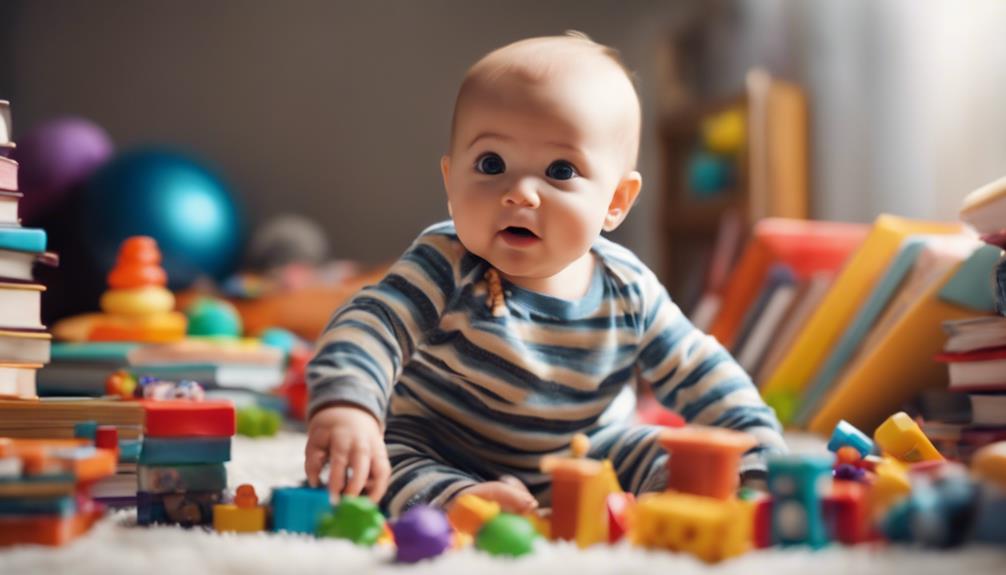
Gifted babies with high energy levels often display vigor and alertness, constantly exploring their surroundings with enthusiasm. Their intense curiosity drives them to seek out new experiences and engage with their environment.
Parents may observe their gifted baby's constant need for stimulation and activity, as they thrive on learning and discovering.
Vigor and Alertness
From an early age, you may notice that gifted babies often display remarkable vigor and alertness, characterized by high energy levels. These children exhibit signs of heightened engagement with their surroundings, demonstrating intense enthusiasm and excitement.
Compared to other kids their age, gifted infants may appear more active, responsive, and keen to explore their environment. Their increased energy levels translate into a greater capacity for movement, play, and interaction with the world around them.
This sustained vigor and alertness are key characteristics of gifted children and can serve as early indicators of their heightened intellectual and physical potential. It's important to nurture and support these traits in gifted babies, providing them with opportunities to channel their energy into constructive activities that stimulate their curiosity and foster their development.
Constantly Exploring Surroundings
Noticing their heightened energy levels, you'll observe that gifted babies are constantly on the move, exploring their surroundings with unwavering curiosity and enthusiasm. These little explorers exhibit a strong desire for new experiences, actively seeking out stimulation to satisfy their innate drive for discovery.
Gifted infants engage in intense play and exploration, driven by their boundless energy to investigate their environment with relentless vigor. Their persistent curiosity reflects a deep-rooted urge for learning and understanding the world around them.
Encourage and support their exploration by providing a safe and stimulating environment that allows them to satisfy their thirst for knowledge. By fostering their inquisitive nature and providing opportunities for discovery, you can help nurture their intellectual development and channel their high energy levels into constructive learning experiences.
Embrace their zest for exploration and watch as they thrive in a world full of new wonders to uncover.
Early Reading Skills
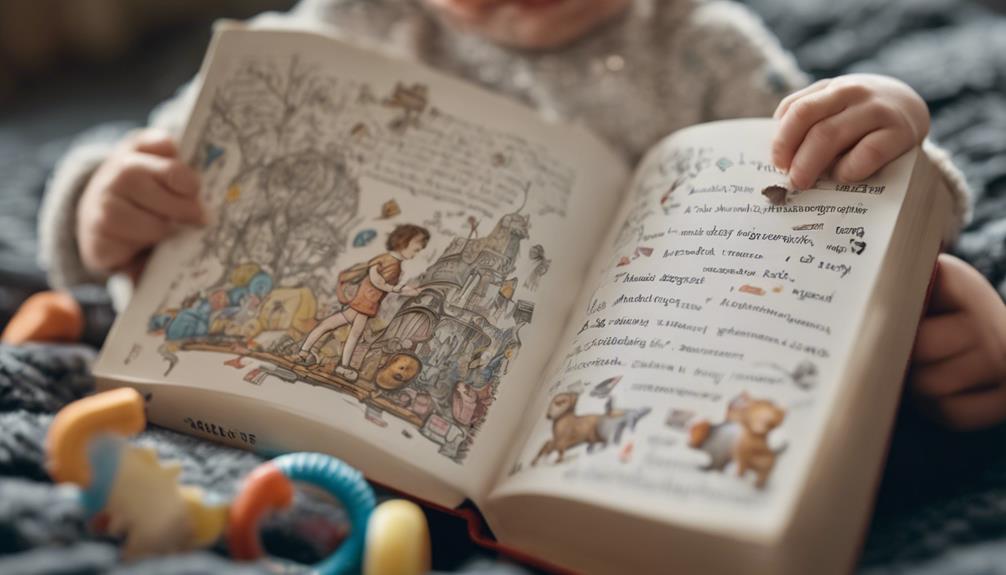
Developing early reading skills in babies can be a significant indicator of giftedness, with some showing a remarkable aptitude for literacy at a tender age. Gifted babies often exhibit signs of advanced reading abilities at a young age, with some starting to read as early as 2-3 years old. These early reading skills can include recognizing letters, sight words, and even reading simple sentences.
Gifted babies with exceptional reading skills may demonstrate a love for storytelling and engaging with literature from a very early age. Some gifted babies show a strong interest in books and reading materials, displaying a keen curiosity for learning through reading. Advanced reading abilities in gifted babies may involve comprehension of complex stories and concepts beyond their age group.
If your baby shows a fascination with books, letters, and words at a young age, it could be a sign of giftedness in the domain of early reading skills.
Sensitivity and Empathy

Gifted babies often exhibit unusually high levels of sensitivity and empathy towards others, displaying a deep emotional understanding and connection with people's feelings at a very young age.
These babies may demonstrate a heightened sensitivity that allows them to pick up on subtle emotional cues and respond in a compassionate manner. For instance, gifted infants might show empathy through comforting gestures or expressions of concern when they sense someone is upset or in distress.
Their exceptional empathy may lead them to have a strong desire to help and support others, even from a very early age. This ability to connect emotionally with those around them sets gifted babies apart and highlights their advanced emotional intelligence.
Parents and caregivers can nurture this sensitivity and empathy by providing a supportive and understanding environment that encourages the development of these remarkable traits in gifted infants.
Frequently Asked Questions
How to Tell if Your Baby Is Gifted?
Wondering if your baby is gifted? Look for early language skills, like diverse vocalizations. Watch for advanced problem-solving abilities and exceptional memory. Notice intense curiosity and enthusiasm to learn. A big vocabulary may also be a clue!
At What Age Does Giftedness Appear?
Feeling like a detective? Giftedness isn't playing hide and seek forever. It can pop up early, sometimes in infancy. Watch for those super smarts, advanced skills, and intense curiosity as early as a few months old!
How to Identify a High IQ Baby?
Notice early language development, curiosity, focus, problem-solving skills, and creativity in your baby. These signs could indicate high IQ potential. Encourage exploration and provide stimulating activities to nurture their gifted abilities from a young age.
What Might Be an Indication of a Gifted Child?
You might notice a gifted child by their early language skills, insatiable curiosity, advanced problem-solving abilities, exceptional memory, and heightened sensitivity. These qualities can indicate a child who is exceptionally bright and talented.
Conclusion
So, if your baby is showing signs of advanced cognitive abilities, exceptional memory skills, and high energy levels, they may be a gifted child. Keep nurturing their curiosity, providing opportunities for learning, and encouraging their talents.
Who knows what amazing things they'll accomplish with the right support and guidance? Trust in their potential and watch them soar.


